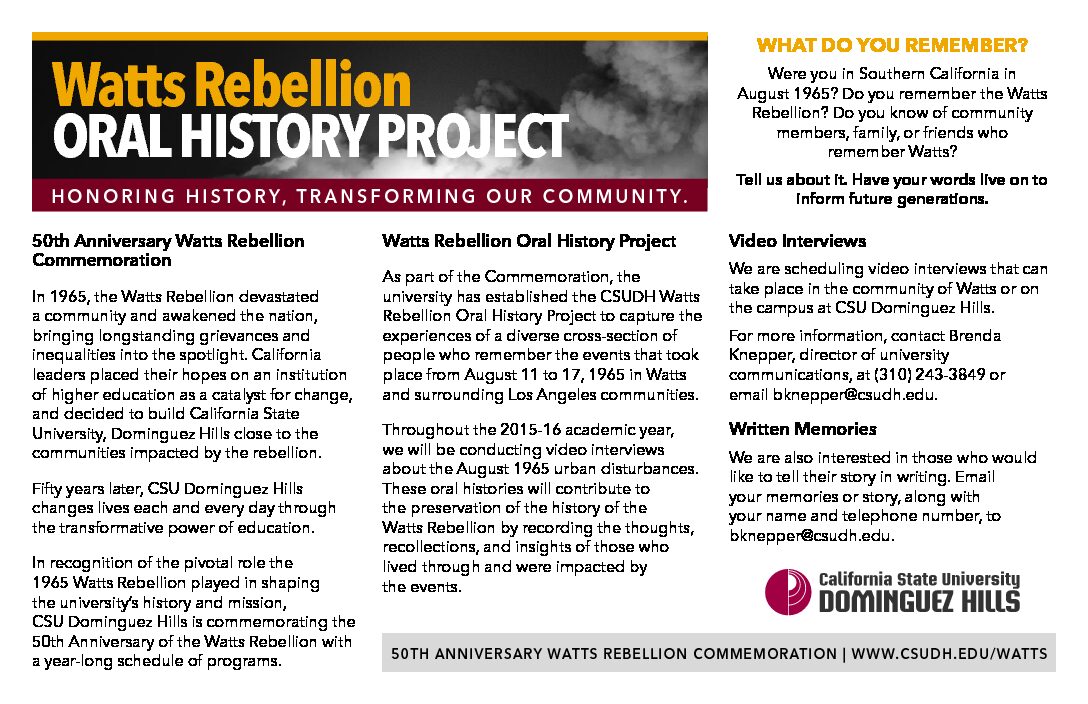The location of this university was moved from its planned site in Palos Verdes in large part to give higher education access to communities ravaged by the 1965 Watts Rebellion. The university commemorated the 50th anniversary of that event in 2005 with a year-long exhibit that included an oral history project.
Saying that even a university “founded on the values of social justice,” is not immune from the great reckoning with America’s legacy of racism and its institutionalization sweeping the country, California State University President Thomas A. Parham today announced the creation of a task force that will examine whether its policies and practices match its mission.
“In the wake of demands for reform and justice, many of society’s most enduring institutions are taking a hard look at their own structures and practices, in an attempt to wrestle with the possibility that their organizations could use more enhanced scrutiny,” Parham wrote in the email,which was sent this morning.
“The community of higher education generally, and this campus specifically, cannot afford to be insulated from any analysis that addresses challenges that lay ahead.
–From President Parham’s Email
“We are an institution of higher learning founded on the values of social justice. We as a campus community cannot become dispassionate spectators to our own history, but must be active participants in our institutional growth and development, to fulfill our vision to be a model urban university.
The Racial Reconciliation Task Force task force will be co-chaired by Dr. Anna Nicole, the chair or the Africana Studies Department, and Dr. Anthony Samad, director of the Mervyn Dymally African American Political and Economic Institute
Here is the entire text of Parham’s email:
July 20, 2020
Campus Community,
The challenges of the past several months have brought into sharp focus the racism and structural inequities that are too pervasive in society. The continued assault on and murder of Black, Brown, and Indigenous people in communities across America leave all of us shaken to our core, angry at the injustice, disgusted at the brutality, nauseated by the inhumanity, and vocal in our indignation. In response to that barbarism, the Black Lives Matter movement and various cohorts of organized social advocates and community members throughout the nation and world have raised their voices in collective outrage, demanding that this nation and its institutions confront the vicious legacy of individual and institutional racism. In the wake of demands for reform and justice, many of society’s most enduring institutions are taking a hard look at their own structures and practices, in an attempt to wrestle with the possibility that their organizations could use more enhanced scrutiny. Indeed, this nation is on the precipice of a social reawakening that demands all segments of society interrogate what they can do to achieve a just and equitable life experience for every citizen.
While certain domains have been the targets of social advocacy and intentional examination around their policies and practices, the community of higher education generally, and this campus specifically, cannot afford to be insulated from any analysis that addresses challenges that lay ahead. We are an institution of higher learning founded on the values of social justice. We as a campus community cannot become dispassionate spectators to our own history, but must be active participants in our institutional growth and development, to fulfill our vision to be a model urban university.
Consequently, I, along with executive leadership, have decided to constitute a Task Force on Racial Reconciliation to assist our campus in identifying ways in which this university can achieve greater degrees of congruence between our aspirational goals and the policies, practices, and institutional customs that frame our educational enterprise.
It will be essential for our campus community to work together and move forward. Therefore, in the spirit of transparency and communication, a web page will be created to list the Task Force members, state its purpose, solicit feedback, and provide ongoing updates. I want to thank Dr. Donna Nicol, chair of Africana Studies, and Dr. Anthony Samad, director of the Mervyn Dymally African American Political and Economic Institute, for agreeing to co-chair this task force. I also want to thank the other members, to be named shortly, who will participate and engage in this important endeavor. I look forward to the recommendations they will advance and to closing the gap between the institution we aspire to be and the policies and practices that we engage in on a daily basis.
I am confident that CSUDH will courageously take the needed steps to move the needle in this complex yet critical work, and I look forward to reporting back to your soon. Simply put, we cannot do it without every member of our village – the students, faculty, staff, and alumni.
Sincerely,
Thomas A. Parham, Ph.D.
President

